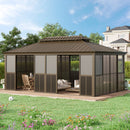LEARN MORE
Need Help?
If you have an issue or question that requires assistance, you can click the button below to drop us an email and we will get back to you within 24 working hours!
FAQs
More1. What type of sauna is best?
As there are various sauna types, the one that fits you the most may be the best sauna type for you. Steam saunas feature a high level of humidity and a lower temperature to create spa-like experiences. Infrared saunas use FIR emitting panels to provide detoxification and deep relaxation for you.
2. Are at-home saunas worth it?
It’s worth having a sauna at your home as it provides various health benefits. Taking saunas regularly can help you improve cardiovascular health, enhance body detoxification, relieve stress and provide full body relaxation.
3. Does a sauna burn fat?
Yes, taking saunas regularly with daily workouts may help people lose weight. Saunas can improve your blood flow in your muscles, joints, and organs, which elevates your exercising level. You’ll be able to burn excessive calories by consistently using this combination for the long term, which leads to increased weight loss.
4. How long should you sit in a sauna?
The length of a sauna session can be variable for different occasions. Usually it takes about 10 to 20 minutes to generate a beneficial effect on your body. If you're taking the sauna after a workout, spending 8 to 15 minutes is adequate for good relaxation.
5. What type of heater is best for a sauna?
Electric or wood-burning heaters are used in traditional saunas to create a low-humidity sauna experience. Steam saunas use sauna stones to create a moist atmosphere with a high humidity. Infrared saunas are applied with multi infrared heaters, which provide faster heating performance.
6. Is it okay to sauna everyday?
It’s OK to sauna everyday. So long as you are in healthy condition and know the necessary safety precautions of using a sauna, you can enjoy saunas on a daily basis while keeping each session for less than 20 minutes.
7. Do home saunas use a lot of electricity?
Typically, traditional saunas(mostly around 2-4 kW) consume more electricity than infrared saunas(mostly around 1-3 kW), but the final cost can vary based on their size, power and time used. For instance, a 2-person infrared sauna use around 2kW of power, multiplying the using time for a month is 30 hours(If running 1 hour per day), the average cost of energy would be 0.16 dollars/kWh x 2 kWh x 30h = $9.6 per month.
8. When to avoid sauna?
People in certain health conditions should not use sauna, including heart disease, kidney problems, low blood pressure, fever, pregnancy and other severe illness. People after drinking alcohol should not use sauna rooms as well.






















































